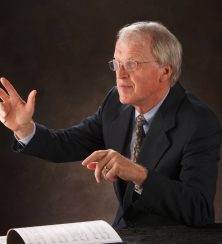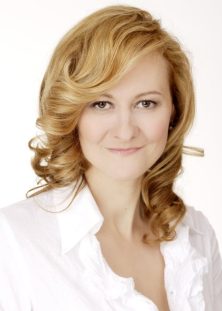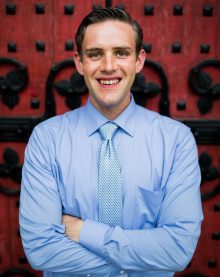Prayer for Peace
SUNDAY, MARCH 20, 2022 AT 19:00h
At Congress Graz Stefaniensaal
A concert of sacred contemporary vocal & organ music by American composers Eli Tamar, and Emmanuel Dubois
as a part of the international music program SPREAD NEW MUSIC TO THE WORLD
with the support of the U.S. Embassy in Austria.
CONCERT PROGRAM
PART I
- "ORGAN SONATA" and "AVE MARIA" by Emmanuel Dubois, performed by soprano Elisabeta Marin and organist Nicholas Will
- "AVE MARIA" by Eli Tamar, performed by mezzo-soprano Hermine Haselböck and organist Nicholas Will
- “O, GLADSOME LIGHT” by Eli Tamar, performed by soprano Yulia Petrachuk and organist Nicholas Will
- TRIO "I PAKI TI REKU" by Eli Tamar, performed by sopranos Yulia Petrachuk and Elisabeta Marin, and mezzo-soprano Hermine Haselböck
- TRIO "LORD'S PRAYER" by Eli Tamar, performed by sopranos Yulia Petrachuk and Elisabeta Marin, mezzo-soprano Hermine Haselböck, and organist Nicholas Will
INTERMISSION 20 MINUTES
PART II
- "PRAYER FOR PEACE" by Eli Tamar, performed by soprano Yulia Petrachuk and organist Nicholas Will
- "SALUTATIO VIRTUTUM" by Eli Tamar, performed by soprano Elisabeta Marin and organist Nicholas Will
- "SAINT FRANCIS PRAYER" by Eli Tamar, performed by mezzo-soprano Hermine Haselböck and organist Nicholas Will
- "AKATHIST TO THE HOLY VIRGIN" by Eli Tamar, performed by soprano Yulia Petrachuk
- CANTATA "CANTICUM FRATRIS SOLIS" by Eli Tamar, performed by soprano Elisabeta Marin, mezzo-soprano Hermine Haselböck, and organist Nicholas Will
LYRICS
PART I
1. "ORGAN SONATA" in 4 parts by Emmanuel Dubois
"It was as a teenager that I first imagined the outline of the melody "Ave Maria" - says composer Emmanuel Dubois.
During the long overnight train ride from Brussels to the pilgrimage town of Lourdes in the French Pyrenees, I had been assigned the care of a paraplegic boy of my age. Once I arrived at the cathedral of Lourdes, I heard thousands of pilgrims processioning and singing by candlelight in the mountains. They prayed for hope or a miracle, for an afflicted relative or for themselves.... or they prayed to have the strength to carry on. I was 15. Forty years later, as a composer, these memories came back.
In the meantime, the memory of seeing "The Cathedral," an extraordinary sculpture by Auguste Rodin of two hands joined in prayer, and the beauty of the landscape of southern France around our house had moved me to compose a large organ work, the solemn Organ Sonata Op. 16. Tragically, in the midst of composing, I revamped the Sonata to reflect the horrific events of September 11, 2001, that had just happened. And, almost subconsciously, I reworked the second movement to represent the mood of compassion, the images of the wheelchair of the boy, of the people processioning at candlelight... From the bucolic first movement, the Organ Sonata metamorphosed and culminated in a massive Fugue and Heroic March for the humanity surrounding us. An expression of determination.
During the 2002 premiere of the Sonata in a high vaulted church in Michigan, USA, I reimagined the sculpture by Rodin and realized that the second movement should be replaced by an "Ave Maria" for soprano and organ better to reflect compassion, respect, peace, and love. It took several more years to find the determination to finalize the composition of the "Ave Maria," Op. 29. On Palm Sunday 2021, the Ave Maria and the Organ Sonata were premiered as an integrated work."
Part I - Prelude
Part II - Ave Maria
Ave Maria Gratia plena dominus tecum
Hail Mary, full of grace, the Lord is with thee.
Bendicta tu in mulieribus
Blessed art thou among women
Et benedictus fructus ventris tui, Iesus
and blessed is the fruit of thy womb, Jesus.
Sancta María, Mater Dei,
Holy Mary, Mother of God,
ora pro nobis peccatoribus
pray for us sinners now
nunc et in hora mortis nostrae. Amen.
and at the hour of our death. Amen.
Part III - Fugue
Part IV - Heroic March
2. "AVE MARIA" by Eli Tamar
Based on the most famous Catholic Prayer, is a short piece in which the composer distilled the sound to reflect the divine, pure light- an eternal source of comfort and assurance for a suffering human soul.
3. “O, GLADSOME LIGHT” (Свете тихий) by Eli Tamar
"O, Gladsome Light '' was composed for countertenor Andrey Nemzer (Metropolitan Opera soloist) in 2011 as part of the score for the film "Leningrad'' (2014), about the siege of Leningrad during WWII. The piece is based on the words of the ancient Christian hymn "Phos Hilaron'', with sections in Greek, Latin, and Church-Slavonic. The original version of the composition is for countertenor and string trio.
Phôs hilaròn hagías dóxēs, athanátou Patrós, ouraníou, hagíou, mákaros, Iēsoû Christé,
Fulgor diej lucidus solisque lumen occidit, Et nos ad horam vesperam te confitemur cantico.
O Light gladsome of the holy glory of the Immortal Father, the Heavenly, the Holy, the Blessed, O Jesus Christ.
Пришедше на запад солнца, видевше свет вечерний, Поём Отца, Сына, и Святаго Духа, Бога.
Having come upon the setting of the sun, having seen the light of the evening, we praise the Father, the Son, and the Holy Spirit: God.
Достоин еси во вся времена петбыти гласы преподобными, Сыне Божий, живот даяй: Тем же мир Тя славит славит.
Worthy it is at all times to praise Thee in joyful voices, O Son of God, Giver of Life, for which the world glorifies Thee.
4. Trio "I PAKI TI REKU" (And so I will tell you again) by Eli Tamar
Is based on Church Slavonic text from the 12-century anonymous inscription on the wall of St. Sophia Cathedral in the ancient city of Novgorod. The poetic text is inward looking and soul-searching.
И пакы ти реку, о душе моя:
And I’ll tell you again, O, my soul!
Чемоу лежиши, чемоу не въстанеши
Why are you lying, why don't you get up
Чемоу не молишися Господоу своемоу дьнь и ночь?
Why don't you pray to your Lord day and night?
Зъло видоучи, а добра не видоучи,
Seeing evil, and not seeing good,
Чоужемоу доброу завидоучи,
Envious of someone else’s good,
А сама добра не творячи?
But yourself (the soul) not doing good?
5. "LORD's PRAYER" (Отче наш) by Eli Tamar
The trio was composed for vocal Trio Melody. The world premiere of the work took place in the concert series "Music of our time" at the Rachmaninov Hall in Moscow Tchaikovsky Conservatory in 2020. The composition, written in Church-Slavonic language, was partially inspired by the Icons of Andrei Rublev (late 14th-century) and Duccio's Maesta (early 14th-century).
Отче наш, иже еси на небесех!
Our Father, which art in heaven,
Да святится имя Твое, да приидет Царствие Твое,
Hallowed be thy Name. Thy Kingdom come.
Да будет воля Твоя, яко на небеси и на земли.
Thy will be done in earth, ыs it is in heaven, as it is in heaven.
Хлеб наш насущный даждь нам днесь;
Give us this day our daily bread,
И остави нам долги наша,
And forgive us our trespasses,
Якоже и мы оставляем должником нашим;
As we forgive them that trespass against us.
И не введи нас во искушение, но избави нас от лукаваго.
And lead us not into temptation, but deliver us from evil.
INTERMISSION 20 MINUTES
PART II
1. "PRAYER FOR PEACE” (Молитва о мире) by Eli Tamar
The piece was composed on lyrics from the prayer "Prayer for Peace in Ukraine," written by an unknown Ukrainian writer in 2019.
It's somber communal pleas for help and salvation. In this work, the composer paid homage to the spectacular musical tradition of Slavic Orthodox music, yet speaking in his unique voice.
Владыко Вседержителю, Святый Царю!
Lord Almighty, Holy King!
Призри с небесе и виждь,
Look from heaven and see
Како враждуют людие земли нашея
How the people of our land are at enmity,
И замышляют друг на друга суетное и злобное.
And plot vain and evil against each other.
О, Многомилостиве! Прости грехи и беззакония наша,
Oh, the Most Merciful! Forgive our sins and iniquities,
Их же ради многия скорби, беды
For the sake of much sorrow, misfortune
И устрашения приидоша на ны.
And intimidation came to us.
Благодатию Пресвятаго Духа
Sprinkle with the grace of the Holy Spirit
Ороси любовию изсохшия сердца людския,
The love of the withering heart of mankind,
Тернием самолюбия, ненависти,
With the thorns of pride, hatred, envy,
Зависти, злобы, вражды, лукавства и иных беззаконий поросшия!
Anger, enmity, deceit, and other iniquities of the growth!
Да возрастят горящую к Тебе
May the love that burns for You
И братиям своим любовь,
And your brethren grow,
И ею да будут истреблены вси распри,
And with it may all strife, quarreling,
Раздоры, разделения во Отечестве нашем.
Division in our Fatherland be destroyed.
Усердно молим Тя: Мир державе нашей даруй,
We earnestly pray to Thee: Grant peace to our power,
Церкви Твоей и всем людем земли нашея.
To Your Church and to all the people of our land.
Ты бо еси Царь мира и мира Твоего несть предела
Thou art the King of Thy peace, And of Thy peace, there is no limit,
И Тебе слава и благодарение
And to Thee glory and thanksgiving
И поклонение от всех да воссылается,
And worship be given from all,
Ныне и присно и во веки веков. Аминь!
Now and ever, and forever and ever. Amen!
2. "SALUTATIO VIRTUTUM" (A Salutation of the Virtue) by Eli Tamar
Lyrics by Saint Francis of Assisi in Latin.
As suggested in the introduction to A Salutation of the Blessed Virgin Mary, the manuscript tradition suggests that Francis saw these virtues as hers; yet they are clearly those of any Christian who has died to sin. Francis greets each virtue in a fashion typical of a medieval troubadour, describes the predisposition which each Christian must have before possessing them, and concludes by interpreting the function of each.
Ave, regina sapientia, Dominus te salvet cum tua sorore sancta pura simplicitate.
Hail, Queen Wisdom! May the Lord protect You, with Your Sister, holy pure Simplicity!
Domina sancta paupertas, Dominus te salvet cum tua sorore sancta humilitate.
Lady holy Poverty, may the Lord protect You, with Your Sister, holy Humility!
Domina sancta caritas, Dominus te salvet cum tua sorore sancta obedientia.
Lady holy Charity, may the Lord protect You, with Your Sister, holy Obedience.
Sanctissimae virtutes, omnes vos salvet Dominus, a quo venitis et proceditis.
Most holy Virtues, may the Lord protect all of You from Whom You come and proceed.
Nullus homo est penitus in toto mundo, qui unam ex vobis possit habere, nisi prius moriatur.
There is surely no one in the whole world who can possess any one of You without dying first.
Qui unam habet et alias non offendit, omnes habet.
Whoever possesses one and does not offend the others possesses all.
Et qui unam offendit, nullam habet et omnes offendit.
Whoever offends one does not possess any and offends all
Et unaquaque confundit vitia et peccata.
And each one confounds vice and sin.
Sancta sapientia confundit satan et omnes malitias eius.
Holy Wisdom confounds Satan and all his cunning.
Pura sancta simplicitas confundit omnem sapientiam huius mundi et sapientiam corporis.
Pure holy Simplicity confounds all the wisdom of this world and the wisdom of the body.
Sancta paupertas confundit cupiditatem et avaritiam et curas huius saeculi.
Holy Poverty confounds the desire for riches, greed, and the cares of this world.
Sancta humilitas confundit superbiam et omnes homines, qui sunt in mundo, similiter et omnia, quae in mundo sunt.
Holy Humility confounds pride, all people who are in the world and all that is in the world.
Sancta caritas confundit omnes diabolicas et carnales tentationes et omnes carnales timores.
Holy Charity confounds every diabolical and carnal temptation and every carnal fear.
Sancta obedientia confundit omnes corporales et carnales voluntates et habet mortificatum corpus suum ad obedientiam spiritus
Holy Obedience confounds every corporal and carnal wish, binds its mortified body to obedience of the Spirit
et ad obedientiam fratris sui et est subditus et suppositus omnibus hominibus, qui sunt in mundo,
and obedience to one’s brother, so that it is subject and submissive to everyone in the world,
et non tantum solis hominibus, sed etiam omnibus bestiis et feris,
not only to people but to every beast and wild animal as well
ut possint facere de eo, quicquid voluerint, quantum fuerit eis datum desuper a Domino.
that they may do whatever they want with it insofar as it has been given to them from above by the Lord.
3. ”SAINT FRANCIS PRAYER" by Eli Tamar
One of the world's beloved prayers, St. Francis Prayer is based on a 20th-century text and is in essence a personal spiritual credo. In Tamar’s music, the prayer is imbued with a deeply mysterious, intense, and at times exalted quality.
Seigneur, faites de moi un instrument de votre paix.
Lord, make me an instrument of your peace.
Là où il y a de la haine, que je mette l'amour.
Where there is hatred, let me bring love.
Là où il y a l'offense, que je mette le pardon.
Where there is offence, let me bring pardon.
Là où il y a la discorde, que je mette l'union.
Where there is discord, let me bring union.
Là où il y a l'erreur, que je mette la vérité.
Where there is error, let me bring truth.
Là où il y a le doute, que je mette la foi.
Where there is doubt, let me bring faith.
Là où il y a le désespoir, que je mette l'espérance.
Where there is despair, let me bring hope.
Là où il y a les ténèbres, que je mette votre lumière.
Where there is darkness, let me bring your light.
Là où il y a la tristesse, que je mette la joie.
Where there is sadness, let me bring joy.
Ô Maître, que je ne cherche pas tant
O Master, let me not seek as much
à être consolé qu'à consoler,
to be consoled as to console,
à être compris qu'à comprendre,
to be understood as to understand,
à être aimé qu'à aimer,
to be loved as to love,
car c'est en donnant qu'on reçoit,
for it is in giving that one receives,
c'est en s'oubliant qu'on trouve,
it is in self-forgetting that one finds,
c'est en pardonnant qu'on est pardonné,
it is in pardoning that one is pardoned,
c'est en mourant qu'on ressuscite à l'éternelle vie.
it is in dying that one is raised to eternal life.
4. "AKATHIST TO THE HOLY VIRGIN" (Акафист Пресвятой Богородице) by Eli Tamar
Composed on Church Slavonic lyrics (in honor of Holy Virgin Icon from Kazan)
Предстояще пред пречистым Твоим образом,
Facing Thy most pure image,
архиереев сословие и вси людие, монаси и мирстии,
the bishops class and all people, monks and laypeople
проповедуют, Госпоже Богородительнице,
preach to the Lady of the Mother of God:
великия Твоя милости, яко грады ограждаеши, обители покрываеши,
Thy great mercies, as you fence off the cities,
веси защищаеши, и, ведуще Тя воистинну Помощницу
cover the houses, protect the villages, and, leading You,
сильну и непобедиму, со слезами приносят Ти молитвы,
truly the strong and unbeatable Helper, with tears bringing their prayers to You,
да простреши к Сыну Твоему Богоносныя руки за люди Твоя,
who stretch out the God-bearing hands to Your Son for Your people,
во еже избавити нас от всех бед и напастей,
for delivering us from all troubles and misfortunes;
да благодарне вопием Богу: Аллилуия.
we thankfully cry out to God: Alleluia.
5. "CANTICUM FRATRIS SOLIS" by Eli Tamar
“I have always been fascinated by the raw human sentiment and drama brought to the genre of sacred music by such composers as Mozart and Verdi. Personally, I am drawn to texts that invite dramatic treatment,” says the composer, Eli Tamar. In this large-scale composition, Tamar weaves together elements of various styles: from Gregorian chant to medieval polyphonic textures, from Renaissance modal harmonies to impressionistic word painting and Italian verismo, all the while without resorting to stylization. The Canticle of the Creatures, written by St. Francis of Assisi, is also known as the the Canticle of the Sun. This hymn, was written during the transition period in the development of the Italian language from Latin, and is the earliest known vernacular literature written in the Umbrian dialect of Italian. There are three sections to the Canticle:
- A praise to God for His creations such as "Brother Sun", "Sister Moon", "Brother Wind", "Sister Water"
This section of the Canticle was written at the end of St. Francis's life (1224) as he was recovering from an illness with St. Claire and the Poor Sisters in San Damiano. At this point in his life, St. Francis was almost completely blind, and yet through his suffering, he composed this song of praise of God for all the wonders of creation.
- A praise for those who forgive for the love of God and who endure trials in peace
The second part of the Canticle was composed when Francis reconciled the bishop and the podestá (Chief Magistrate) of Assisi. He sent his friars to sing the first part of the canticle in front of them which led to their reconciliation.
- A praise for "Sister Bodily Death", and to those "whom death will find in Your most holy will"
According to tradition, the first time the Canticle was sung in its entirety was by Francis and Brothers Angelo and Leo, two of his original companions, on Francis' deathbed. The final verse praising "Sister Death" was said to have been added only a few minutes before Francis' death.
«Altissimu, onnipotente, bon Signore,
Most high, all-powerful, all-good Lord!
Tue so' le laude, la gloria e l'honore et onne benedictione.
All praise is yours, all glory, all honor, and all blessing.
Ad te solo, Altissimu, se konfàno
To you, alone, Most High, do they belong.
Et nullu homo ène dignu te mentovare.
No mortal lips are worthy to pronounce your name.
Laudato sie, mi' Signore, cum tucte le tue creature,
Be praised, my Lord, through all your creatures,
spetialmente messor lo frate sole,
Especially through my Lord Brother Sun,
lo qual è iorno, et allumini noi per lui.
Who brings the day; and you give light through him.
Et ellu è bellu e radiante cum grande splendore,
And he is beautiful and radiant in all his splendor!
De te, Altissimo, porta significatione.
Of you, Most High, he bears the likeness.
Laudato si', mi' Signore, per sora luna e le stelle,
Be praised, my Lord, through Sister Moon and the stars;
In celu l'ài formate clarite et pretiose et belle.
in the heavens, you have made them precious and beautiful.
Laudato si', mi' Signore, per frate vento
Be praised, my Lord, through Brothers Wind and Air,
Et per aere et nubilo et sereno et onne tempo,
and clouds and storms, and all the weather,
Per lo quale a le tue creature dài sustentamento.
through which you give your creatures sustenance.
Laudato si', mi' Signore, per sor'aqua,
Be praised, My Lord, through Sister Water;
La quale è multo utile et humile et pretiosa et casta.
She is very useful, and humble, and precious, and pure.
Laudato si, mi signore, per frate focu,
All praise be yours, my Lord, through Brother Fire,
per lo quale Enn'allumini la nocte,
Through whom you brighten up the night.
ed ello è bello et iocundo et robustoso et forte.
How beautiful is he, how cheerful! Full of power and strength.
Laudato si, mi signore, per sora nostra matre terra,
All praise be yours, my Lord, through our Sister
Mother Earth,
La quale ne sustenta et governa, et produce diversi fructi con coloriti flori et herba.
who sustains us and governs us and produces various fruits with colored flowers and herbs.
Laudato si, mi signore, per quelli ke perdonano
All praise be yours, my Lord, through those who grant pardon
Per lo tuo amore, et sostengo infirmitate et tribulatione.
For love of you; through those who endure sickness and trial.
Beati quelli ke 'l sosterrano in pace, ka da te, altissimo, sirano incoronati.
Happy are those who endure in peace, by You, Most High, they will be crowned.
Laudato si, mi signore, per sora nostra morte corporale,
All praise be yours, my Lord, through Sister Death corporal,
Da la quale nullu homo vivente pò skappare.
From whose embrace no mortal can escape.
Guai acquelli, ke morrano ne le peccata mortali:
Woe to those who die in mortal sin!
Beati quelli ke trovarà ne le tue sanctissime voluntati,
Happy those she finds doing your will!
Ka la morte secunda nol farrà male.
The second death can do them no harm.
Laudate et benedicete mi signore, et rengratiate
Praise and bless my Lord, and give him thanks
Et serviateli cun grande humilitate.
And serve him with great humility.

COMPOSER M EMMANUEL DUBOIS grew up in Brussels and received his master’s degree in organic chemistry from the University of Brussels; after moving to the United States, he began his scientific career. Emmanuel then earned an MBA from the University of North Carolina and took up a prominent banking position. Not until the age of 46 did Dubois decide to follow his artistic dream. So, he entered the University of Michigan, where he studied composition. Within 25 years, he created about 60 works performed at the world’s leading venues. In 2019, his oratorio “Requiem for the Fallen” was US-premiered by Lyrica Classic at Carnegie Hall in NYC. In 2020, the oratorio was selected by the US Embassy in Moscow for its “Mission to Russia” annual program and Russian-premiered by Lyrica Classic in December 2020 in memory of the fallen in WWII.
In 2021, Dubois’ piano concerto “Imagine New York” was world-premiered at Zurab Tsereteli Gallery by famous pianist and soloist of Mariinsky Theater, Mikhail Benediktov and orchestra Voce Anima conducted by Michael Kotelnikov.

COMPOSER ELI TAMAR’S multicultural background has contributed to his ability to explore and synthesize elements of different styles, overcoming spiritual barriers between various musical, literary, and religious traditions. His compositions were featured in such venues as St. Paul’s Knightsbridge Church in London, American Church in Paris, Rachmaninov Hall at Moscow Conservatory, Carnegie Music Hall in Pittsburgh, San Marcello al Corso Church in Rome, “De Boni Arte” Foundation series of sacred music and “Great Names in Art” – Charitable Foundation in Russia, Diaghilev Festival in Perm, and Prism concerts in New York. Many of his compositions have been premiered by the renowned countertenor, soloist of the Metropolitan Opera, Andrey Nemzer. In 2021 Eli Tamar served on the jury of the First International Competition of Christian Music Composers, held in Moscow.
In December 2021, Lyrica Classic world-premiered Eli’s “Requiem” at Moscow Sobornaya Palata by renowned Moscow Synodal Choir and the famous mezzo-soprano, soloist of the Novaya Opera Theater and the Hungarian State Opera House in Budapest, Polina Shamaeva.

The Austrian MEZZO-SOPRANO HERMINE HASELBÖCK studied at the music academies in Vienna and Detmold. She worked with conductors such as Bertrand de Billy, Jean-Claude Casadesus, Vladimir Fedosejev, Adam Fischer, Nikolaus Harnoncourt, Gustav Kuhn, Fabio Luisi, Jean-Christophe Spinosi, Kirill Petrenko, Christian Thielemann, Franz Welser-Möst, and Jaap van Zweden.
Her international work as a song and concert singer has taken her to Carnegie Hall NY, Wiener Konzerthaus, Musikverein Vienna, Mozarteum Salzburg, Bing Theater Los Angeles, Accademia Nazionale di Santa Cecilia Rome, Gewandhaus Leipzig, Philharmonie im Gasteig Munich, Frauenkirche Dresden, and the Teatro San Carlo, as well as many high-level international festivals.
She sang many leading roles at such theaters and concert venues as Concertgebouw Amsterdam, Theater an der Wien, Grand Theater de la Ville Luxemburg, Tokyo National Opera, Volksoper Vienna, Oper Graz, Die Götterdämmerung in Hong Kong, Tiroler Festspiele Erl, Beijing, Tiroler Festspiele, Shanghai Symphony Hall, and many others.
Her CD "Songs by Zemlinsky" was awarded the Pasticcio Prize from Radio Ö1 in 2004 and the Alexander-Zemlinsky Förderpreis in 2005. Her recording of "Mahler's Lieder" received the Supersonic Award from the Journal Pizzicato in 2014.
Hermine Haselböck has been teaching as a visiting professor for solo singing at the University of Art in Graz since 2017 and at the JJF Conservatory in Graz since 2020.

The Romanian-born SOPRANO ELISABETA MARIN is known to the Viennese audience from numerous roles at the Vienna State Opera. Prior to 2012, Elisabeta Marin performed as Musetta in Puccini’s “La Bohème” under Louis Langrée, the 2nd flower girl in Richard Wagner’s “Parsifal”, Helmwige from Wagner’s “Die Walküre” under Franz Welser-Möst, along with many other roles. She also sang as the celebrated Micaela in Bizet’s “Carmen,” the enchanting Tatjana in Tchaikovsky’s “Eugene Onegin,” and the charismatic Nedda in Leoncavallo’s “Pagliacci” on European stages. Elisabeta Marin can also be heard in concerts as a sought-after soprano. She completed her training with a master’s degree in solo singing at the renowned Vienna Conservatory, a private university. Numerous awards demonstrated her professionally successful path.
In 2016, Elisabeta Marin impressed as a strong, independent Tosca in the crypt deep below St. Peter’s Church in Vienna. With a powerful yet sensitive voice, she fulfills this demanding role with vitality and luminous expression. In 2017, Elisabeta made her debut as Elisabetta in G. Verdi's opera "Don Carlo" at the Romanian National Opera Cluj Napoca, Romania.

SOPRANO YULIA PETRACHUK started her debut as a professional opera singer at the State Theater Bern, Switzerland, in 2010. After that, she performed with many other recognized opera companies and concert venues such as Theater Biel (Switzerland), Ash Lawn Opera Festival (US), Opera Ischia (Italy), Dicapo Opera Theater in New York (US), Great Moscow Hall (Russia), Vocal Productions NYC (US), Nova and Opera Camerata in Washington, D.C. (US), Smetana Hall in Prague (Czech Republic), Carnegie Hall in New York (US), Musikverein and Wiener Konzerthaus in Vienna (Austria), and many others. Yulia specializes in contemporary opera and other forms of vocal music of the 20th and 21st centuries. She has performed many World and US premieres. Recently, Yulia performed the Elektra's role in Strauss' opera "Elektra" with Thueringen Philharmonic orchestra and conductor Ernest Hoetzl in Austria and Germany - "The audience gave endless applause and shouts of bravo in response to this overwhelming performance by Yulia Petrachuk…" – Horst Groener, Thüringer Allgemeine.
Out of her passion and drive to sustain and give lesser-known and unknown music a voice, Yulia Petrachuk founded Lyrica Classic Entertainment as a sounding beacon to deliver superior-level presentation of music.

ORGANIST NICHOLAS WILL is Director of Liturgical Music, Organist & Lecturer at Mount St. Mary’s Seminary in Emmitsburg, Maryland. From 2018 to 2020, he held a similar position at the Pontifical North American College, Rome, and from 2013 to 2018, he was an Assistant Professor of Music and Coordinator of the Sacred Music Program at Franciscan University of Steubenville. A graduate of Duquesne University and the Peabody Conservatory of Music with additional study at the Pontifical Institute of Sacred Music, Rome, Nicholas is a past winner of the André Marchal Award for Excellence in Organ Performance (Duquesne), the Dorothy DeCourt Prize in Organ (Peabody), the Young Organists’ Audition sponsored by the Pittsburgh Concert Society, and the Duquesne University Concerto Competition. He has performed as an organist, accompanist, and conductor throughout the eastern United States and in Italy, the Netherlands, Belgium, France, and Croatia. Nicholas is also the Founder and President of the Saint Gregory Institute of Sacred Music, a non-profit organization dedicated to training present and future generations of church musicians.
Learn more about the project
